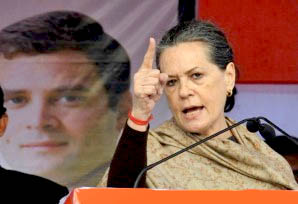 Lakhimpur (Assam), Mar 30: Mounting an attack on the BJP, UPA Chairperson Sonia Gandhi today said the Opposition party "talks big" and believes in the "politics of hate."
Lakhimpur (Assam), Mar 30: Mounting an attack on the BJP, UPA Chairperson Sonia Gandhi today said the Opposition party "talks big" and believes in the "politics of hate."
Congress has strengthened the country's 'Ganga-Jamuna' culture but the BJP is all out to weaken the country, she said addressing an election rally in Lakhimpur town.
"The opposition, particularly the BJP, are going round the country indulging in big talk but what did their government do when they were in power at the Centre? There is a big difference between talking and working", Gandhi said.
"We have fulfilled almost all promises made in the 2009 manifesto. We will do the same with the 2014 manifesto and we need your support for this," she said.
"We do not make false promises. What we promise, we deliver. The Congress believes in 'Har Haath Shakti, Har Haath Tarakki (Each hand is power, each hand is progress", Gandhi said.
Congress workers in Assam and other places have been sacrificing their lives for the country before independence and even after the country became free, it is they who are engaged in nation-building.
"Where was the BJP and others then? There was no sign of the opposition either before or after independence. They are just engaged in division of the country, she charged.
"The Congress has strengthened the country's Ganga- Jamuna culture but the BJP instead of strengthening it, is all out to weaken the country," Gandhi said.
She urged the people not to be swayed by the "false promises of the opposition but be guided by their own good sense and take a decision to support the Congress and vote for their candidates."
"There is a lot of difference between working and talking. North-east people know real nationalism, hope you will not be mislead by those who are simply beating the drums of nationalism," Gandhi said.
Targeting the BJP, she said, "Congress has always shed blood and sacrificed for the country. On the other hand is a party that has only divided the society."
Highlighting the achievements of the UPA government at the Centre and the Congress in Assam, the UPA Chairperson said her party believes in the welfare of the backward classes and the underprivileged sections of the society.
"Prime Minister Manmohan Singh is personally supervising implementation of the various welfare schemes initiated by the UPA government for the welfare of the poor, Dalits, adivasis, backward classes, women and farmers," Gandhi said.
The RTI, MNREGA, Right to Work, Food Security Act and other schemes have now become a right under the law while educational facilities and tribal developments schemes are all steps to ensure that all lead a life of respect and dignity, she said.
In Assam, Chief Tarun Gogoi has been working "relentlessly" for the last 13 years for the development and progress of the state which, she said, "is there for all of you to see."
"I know how you suffer during floods and the government has taken several flood management schemes to solve this problem. Good work has been done in Dikrong, Dhemaji and Majuli", she added.
The Congress has promised housing and "we have succeeded in implementing this to a large extent", Gandhi said.
"We also promised a life of dignity for the elderly, widowed and disabled which we are committed to fulfil, the UPA Chairperson said.
The Congress has initiated several schemes for the welfare of the tea garden workers and this has helped in improving their economic and social condition, Gandhi added.





Comments
Add new comment